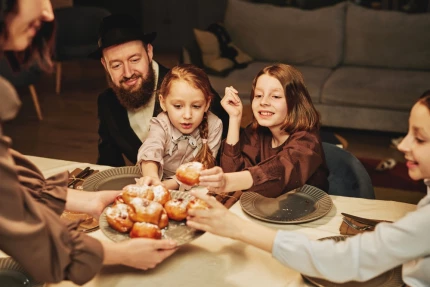Converting to Judaism as a Woman
The decision to convert to Judaism as a woman represents a profound spiritual journey that requires dedication, understanding, and commitment to Jewish traditions and values. The path of becoming Jewish encompasses various aspects of religious life, cultural integration, and personal transformation that differ significantly between different streams of Judaism.
an Israeli citizenship specialist
The conversion process for women
The process of converting to Judaism for women involves several crucial stages that vary depending on the denomination. Orthodox Judaism typically requires immersion in a mikveh (ritual bath), acceptance of mitzvot (commandments), and often circumcision for male converts. Women must demonstrate sincere commitment through extensive study and lifestyle changes. Reform Judaism, while maintaining core elements, may have different requirements and interpretations regarding the conversion process. Both streams emphasize the importance of understanding Jewish history, laws, and customs before one can officially become part of the community.
A woman considering conversion should be aware of these fundamental steps:
The journey of converting to Judaism as a woman demands significant commitment but offers profound spiritual fulfillment. Be it through Orthodox or Reform traditions, each individual’s transformation enriches the collective experience of faith-based living.
Differences in conversion for women in Reform and Orthodox Judaism
While both Reform and Orthodox Judaism share common roots, their approaches to conversion differ significantly. Orthodox Judaism maintains traditional requirements and views conversion as a lifelong commitment to all 613 mitzvot. Person must demonstrate complete acceptance of these commandments and show willingness to integrate fully into an Orthodox lifestyle. The process is typically longer and more rigorous, often taking several years.
Reform Judaism, on the other hand, embraces a more flexible approach. While still requiring serious study and commitment, it places greater emphasis on personal choice and individual interpretation of Jewish law. The conversion process might be shorter and less demanding in terms of strict observance. However, both denominations agree that true conversion requires genuine intention and understanding of what it means to become Jewish.
The following table illustrates key differences in the conversion process:
| Aspect | Orthodox Judaism | Reform Judaism |
| Study Duration | Typically 1-2 years | Varies, often shorter |
| Mikveh Requirement | Mandatory | Generally required |
| Mitzvot Observance | Full commitment required | More flexible approach |
| Rabbi’s Role | Central and authoritative | Guiding but less formal |
| Community Integration | Essential | Important but adaptable |
Jewish women and marriage with non-Jews
The question “can a jewish woman marry a non jewish man” carries significant weight in tradition. According to Orthodox rules, such marriages are not recognized within the faith. For a marriage to be considered valid in Jewish law, both partners must be Jewish. This rule stems from centuries-old traditions and the desire to maintain religious continuity.
Those who marry outside the faith community encounter challenging choices regarding their children’s spiritual education and family customs. Some choose to convert their partners to ensure their children will be raised Jewish, while others find ways to blend different traditions.
Despite these challenges, many in interfaith relationships discover meaningful ways to maintain their cultural and religious heritage. They often seek out community support, participate in Jewish events, and incorporate traditions into their family life. This approach allows them to maintain a connection to their heritage while fostering an inclusive environment for their partners and children. In some cases, these families create unique hybrid traditions that honor both backgrounds, demonstrating the adaptability of Jewish culture in modern, multicultural societies. Such efforts highlight the importance of open communication and mutual respect in navigating the complexities of interfaith marriage.
The Jewish status of children of converted women
The concept of matrilineal descent underscores the significance of the mother’s role in shaping a child’s Jewish identity, both religiously and culturally. For families navigating interfaith dynamics, this principle can influence decisions about conversion and religious upbringing. In Reform and other progressive movements within the faith, patrilineal descent is acknowledged under certain conditions, such as the child being raised in the traditions of the faith and receiving appropriate religious education. However, these more inclusive approaches are not universally accepted, particularly within Orthodox Judaism, where traditional interpretations of matrilineal descent remain firmly upheld. This divergence highlights the ongoing dialogue and sometimes tension between preserving ancient traditions and adapting to contemporary realities.
FAQ
The conversion process can be emotionally and intellectually demanding. Women often need to balance their studies with daily responsibilities while adapting to new rituals and customs. Social integration and acceptance by the community can also present challenges.
The duration varies significantly. Orthodox conversions usually take at least a year, often longer, while Reform conversions might be completed in a shorter timeframe. The process depends on individual circumstances and the supervising rabbi’s assessment.
Yes, upon completing the conversion process, a woman becomes a full member of the Jewish community. While there might be initial curiosity about her background, she has the same rights and obligations as those born Jewish.
This situation requires careful consideration and support. Many rabbis recommend counseling and open communication with family members. The conversion process should be based on personal conviction rather than external pressure.
Once properly converted, a woman faces no restrictions in marrying within the Jewish community. However, some families might initially prefer matches between individuals born Jewish, particularly in Orthodox circles.
While both religions share some common roots, their approaches to women’s roles differ significantly. Judaism emphasizes specific mitzvot and rituals unique to women, creating distinct spiritual practices compared to Christian traditions.
Most Jewish communities offer various resources including classes, mentors, and support groups. Connecting with other converts can provide valuable guidance and encouragement throughout the process.
an Israeli citizenship specialist
